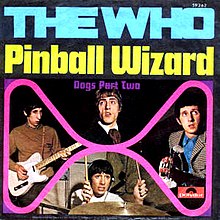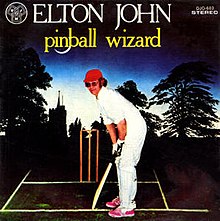Pinball Wizard
| "Pinball Wizard" | ||||
|---|---|---|---|---|
 | ||||
| Single by The Who | ||||
| from the album Tommy | ||||
| B-side | "Dogs Part Two" | |||
| Released | 7 March 1969 | |||
| Recorded | 7 February 1969 | |||
| Studio | Morgan, Willesden, London | |||
| Genre | ||||
| Length | 2:57 | |||
| Label | Track | |||
| Songwriter(s) | Pete Townshend | |||
| Producer(s) | Kit Lambert | |||
| The Who singles chronology | ||||
| ||||
| Audio sample | ||||
| ||||
"Pinball Wizard" is a song written by Pete Townshend and performed by the English rock band the Who, featured on their 1969 rock opera album Tommy. The original recording was released as a single in 1969 and reached No. 4 in the UK charts and No. 19 on the U.S. Billboard Hot 100.
The B-side of the "Pinball Wizard" single is an instrumental credited to Keith Moon, titled "Dogs Part Two". Despite the title, it has no musical connection to the Who's 1968 UK single "Dogs".
Story[]
The lyrics are written from the perspective of a pinball champion, called "Local Lad" in the Tommy libretto book, astounded by the skills of the opera's eponymous main character, Tommy Walker: "He ain't got no distractions / Can't hear those buzzers and bells / Don't see lights a flashin' / Plays by sense of smell / Always gets a replay / Never seen him fall / That deaf dumb and blind kid / Sure plays a mean pin ball.",[3] and "I thought I was the Bally table king, but I just handed my pinball crown to him".
Townshend once called it "the most clumsy piece of writing [he'd] ever done".[4] Nevertheless, the song was a commercial success and remains one of the most recognised tunes from the opera. It was a perpetual concert favourite for Who fans due to its pop sound and familiarity.
Position on the album[]
In late 1968 or early 1969, when The Who played a rough assembly of their new album to critic Nik Cohn, Cohn gave a lukewarm reaction to it. Following this, Townshend, as Tommy's principal composer, discussed the album with Cohn and concluded that, to lighten the load of the rock opera's heavy spiritual overtones (Townshend had recently become deeply interested in the teachings of Meher Baba), the title character, a "deaf, dumb, and blind" boy, should also be particularly good at a certain game. Knowing Cohn was an avid pinball fan, Townshend suggested that Tommy would play pinball, and Cohn immediately declared Tommy to be a masterpiece.[citation needed] The song "Pinball Wizard" was written and recorded almost immediately. The single version was slightly sped up and runs to 2:57, whilst the natural length album version runs to 3:04.
Reception[]
Billboard described the single as "a solid beat rocker."[5]
Live performances[]
This song is one of the band's most famous live songs, being played at almost every Who concert since its debut live performance on 2 May 1969. The live performances rarely deviated from the album arrangement, save for an occasional jam at the end sometimes leading to another song. Bootleg recordings show that this song has been known to last as long as 8 minutes (at a concert at the Rainbow Theatre in London on 3 February 1981), although live versions lasting as long as that are extremely rare. Pinball Wizard was also played during the Super Bowl XLIV Halftime Show on 7 February 2010.
Personnel[]
- Roger Daltrey – lead vocals
- Pete Townshend – backing vocals, co-lead vocals, acoustic guitar, electric guitar
- John Entwistle – bass guitar
- Keith Moon – drums
Charts and certifications[]
This section needs additional citations for verification. (December 2017) |
Weekly charts[]
|
Year-end charts[]
Certifications[]
| |||||||||||||||||||||||||||||||||||||||||
Elton John version[]
| "Pinball Wizard" | ||||
|---|---|---|---|---|
 | ||||
| Single by Elton John | ||||
| from the album Tommy soundtrack | ||||
| B-side | "Harmony" | |||
| Released | 12 March 1976 | |||
| Recorded | 1974 | |||
| Genre |
| |||
| Length | 5:14 | |||
| Label |
| |||
| Songwriter(s) | Pete Townshend | |||
| Producer(s) | Gus Dudgeon | |||
| Elton John singles chronology | ||||
| ||||
| Audio sample | ||||
| ||||
The song was performed by Elton John in Ken Russell's 1975 film adaptation of Tommy. This version was released in 1975 as a promotional single only in the US, and in 1976 in the UK, where it reached number 7. Because it was not released as a commercial single in the US, it was ineligible to be listed on the Billboard Hot 100 chart, it did however make the US Radio & Records airplay chart where it reached number 9.
John's version uses a piano as the song's centerpiece in place of the acoustic guitar in the original (in the film, John's character is shown playing his pinball machine via a small piano keyboard), and features additional lyrics specially written by Townshend for the movie version, as well as a subtle inclusion of musical phrases from The Who's 1960s hit "I Can't Explain" during the outro (similarly, The Who's later cover of Elton John's "Saturday Night's Alright for Fighting" included parts of "Take Me to the Pilot"). Unlike most of the soundtrack's music, which featured various combinations of The Who and some of the era's best session players, Elton John used his own band and producer Gus Dudgeon for the track. John has performed the song as part of his Las Vegas Red Piano Show, as well as on various tours. To date, it is the only cover of a Who song to reach the top 10.[13]
The song has subsequently been performed by Taron Egerton who portrayed Elton John in the film Rocketman (2019).
Personnel[]
- Ray Cooper – tambourine, congas
- Davey Johnstone – acoustic and electric guitars, backing vocals
- Elton John – lead vocals, piano
- Dee Murray – bass, backing vocals
- Nigel Olsson – drums, backing vocals
Chart performance[]
In Toronto, "Pinball Wizard" spent two weeks at number one on the CHUM survey.[14] In Chicago, "Pinball Wizard" remained on the WLS Musicradio Survey as an "extra" for five and a half months, from mid-April to late September as an album track in heavy rotation.[15]
| Weekly chart (1976) | Peak position |
|---|---|
| Australia[16] | 88 |
| UK[17] | 7 |
| Ireland (IRMA)[18] | 13 |
| US Radio & Records[19] | 9 |
Other cover versions[]
- The song was featured in a medley with another song from Tommy ("See Me, Feel Me") in a recording by the British pop group The New Seekers in 1973. This version reached No. 16 on the UK charts and in Australia, and No. 28 in Canada,[20] and No. 29 U.S.
- In 1977, Barry Williams performed the song during a "Songs from Movies" medley on an episode of The Brady Bunch Variety Hour.[21]
- Tenacious D also regularly perform the song as a part of a medley of songs from Tommy[22]
In popular culture[]
- The track is featured on the video games Rock Band 2, Rock Band Unplugged and Karaoke Revolution: American Idol Encore 2, as well as on The Who's Tommy Pinball Wizard.[23]
- Bruce Springsteen makes a reference to the song in his song "4th of July, Asbury Park (Sandy)", in the album The Wild, the Innocent, & the E Street Shuffle, with the lyric "And the wizards play down on Pinball Way".[24]
References[]
- ^ Bosso, Joe (11 May 2016). "The 25 Greatest Acoustic Songs in Hard Rock". Guitar Player. NewBay Media. Retrieved 5 August 2016.
- ^ Stanley, Bob (13 September 2013). Yeah Yeah Yeah: The Story of Modern Pop. Faber & Faber. p. 348. ISBN 978-0-571-28198-5.
- ^ "Pinball Wizard Lyrics". www.lyrics.com.
- ^ Remaster Liner Notes to Tommy "Deaf, Dumb and Blind kid" by Richard Barnes
- ^ "Spotlight Singles" (PDF). Billboard. 22 March 1969. p. 71. Retrieved 20 February 2021.
- ^ "Item Display - RPM - Library and Archives Canada". Collectionscanada.gc.ca. 26 May 1969. Retrieved 1 July 2019.
- ^ "SA Charts 1965 – March 1989". Retrieved 5 September 2018.
- ^ [Joel Whitburn's Top Pop Singles 1955-2002]
- ^ "Cash Box Top 100 5/31/69". 30 June 2016.
- ^ http://www.sixtiescity.net/charts/69chart.htm#top100
- ^ Whitburn, Joel (1999). Pop Annual. Menomonee Falls, Wisconsin: Record Research Inc. ISBN 0-89820-142-X.
- ^ "British single certifications – The Who – Pinball wizard". British Phonographic Industry. Retrieved 5 July 2018.Select singles in the Format field. Select Silver in the Certification field. Type Pinball wizard in the "Search BPI Awards" field and then press Enter.
- ^ Sexton, Paul (20 March 2018). "Elton John Sure Played A Mean Cover Of 'Pinball Wizard'".
- ^ CHUM Hit Parade, May 10, 1975
- ^ http://www.oldiesloon.com/il/wls750927.htm
- ^ Kent, David (1993). Australian Chart Book 1970–1992 (doc)
|format=requires|url=(help). Australian Chart Book, St Ives, N.S.W. ISBN 0-646-11917-6. - ^ "pinball+wizard - full Official Chart History - Official Charts Company". officialcharts.com.
- ^ "The Irish Charts – Search Results – Pinball Wizard". Irish Singles Chart. Retrieved 22 June 2017.
- ^ Whitburn, Joel (2019). Radio & Records Top Pop Hits 1973-2009. Sheridan Books. p. 70. ISBN 978-0-89820-231-1.
- ^ "Item Display - RPM - Library and Archives Canada". Collectionscanada.gc.ca. Retrieved 2 October 2016.
- ^ Nichelson, Ted (2009). Love to Love You Bradys: The Bizarre Story of the Brady Bunch Variety Hour. ECW Press. p. 291. ISBN 9781550228885.
- ^ "Tenacious D Dig Into Who Catalog for Concert Medley". Ultimate Classic Rock.
- ^ According to the game's flyer[permanent dead link].
- ^ "Bruce Springsteen Lyrics database : 4th of July, Asbury Park (Sandy)". www.brucespringsteen.it. Retrieved 29 November 2016.
External links[]
- Lyrics of this song at MetroLyrics
- The Who - Pinball Wizard on YouTube
- Elton John - Pinball Wizard on YouTube
- 1969 singles
- 1975 singles
- 1976 singles
- The Who songs
- Elton John songs
- Works about pinball
- Songs written by Pete Townshend
- Decca Records singles
- DJM Records singles
- MCA Records singles
- Polydor Records singles
- Track Records singles
- Song recordings produced by Kit Lambert
- 1969 songs